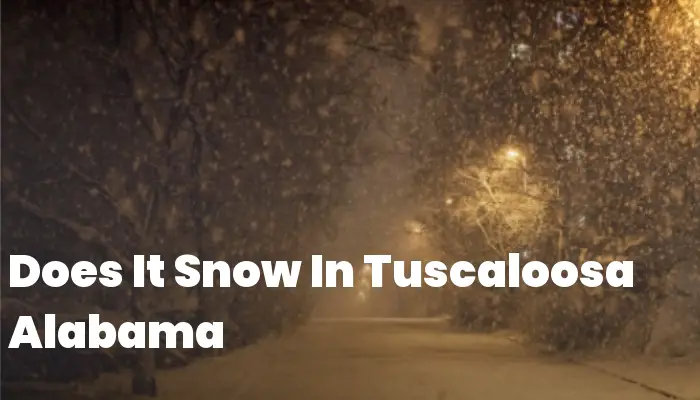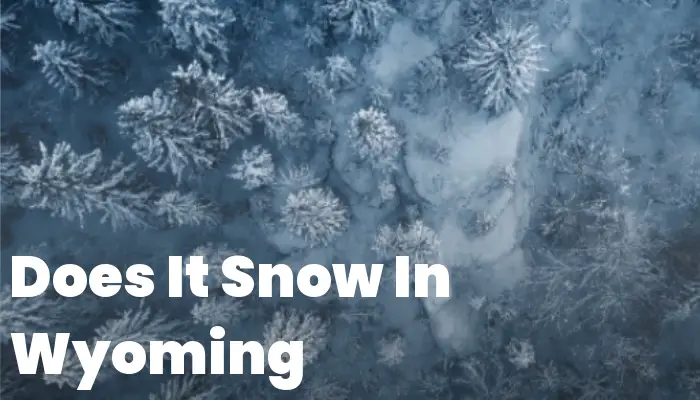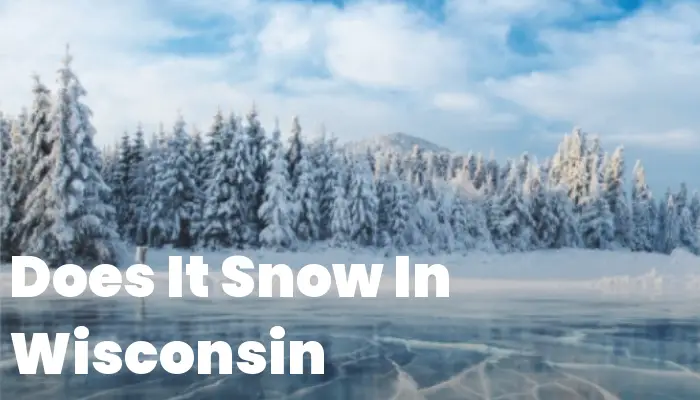Ever wondered about the weather in the Heart of Dixie? Specifically, does it snow in Tuscaloosa, Alabama?
Find your answer as we delve into the climatic patterns of this Southern city.
Grab a cup of tea and join us as we explore everything – from Tuscaloosa’s average temperature to its most extreme weather conditions.
Does It Snow In Tuscaloosa Alabama?
If you’re pondering whether the winter wonderland experience extends to Tuscaloosa, the answer is yes, but infrequently. While Tuscaloosa is far from being a snow-sports destination, the city does enjoy a dusting of snow from time to time. Situated in west-central Alabama, Tuscaloosa experiences a humid subtropical climate. This means it has hot summers and mild winters. However, cold fronts pushing down from the north can bring in enough chill for precipitation to turn into snow.
Despite its Southern location, winter months in Tuscaloosa can sometimes see temperatures dip below freezing, paving the way for snowfall. On average, residents might witness snow on the ground once or twice during the winter season. However, due to relatively warmer ground temperatures and modest snowfall amounts, accumulation—if it occurs—is typically light and transient.
When it does snow in Tuscaloosa, social media often lights up with excitement as locals share images of gentle flurries coating their gardens and streets—a rare treat that gives this Southern city a temporary northern feel.
How Much Does It Snow In Tuscaloosa Alabama?
Talking about quantities of snow in Tuscaloosa prompts one to manage their expectations. The city doesn’t rack up impressive numbers when it comes to annual snowfall measurements. On average, Tuscaloosa sees less than 1 inch (2.5 cm) of snow per year. This is far cry from what you’d expect in more traditionally snowy regions of the United States.
To put that into perspective, most of the wintry precipitations result in just a light frosting rather than a heavy blanket—enough to inspire some wintertime cheer but seldom leading to major disruptions or requiring significant plowing services. Typically,snowfalls are scattered through December to February.
During some years—especially those marked by particularly aggressive cold snaps—the amounts might exceed this average slightly; however,such occurrences are outliers rather than norms. Thusly equipped with this knowledge about typical accumulation levels—or lack thereof—you can understand why sleds and salt supplies aren’t high on residents’ shopping lists.
Are There Ice Storms In Tuscaloosa Alabama?
While heavy blankets of white are not common-place for residents in “The Druid City,” ice storms do rear their heads every so often as part of Tuscaloosa’s winter repertoire. These meteorological events happen when there’s freezing rain—rain that falls when surface temperatures are below 32 degrees Fahrenheit (0 degrees Celsius). The rain droplets become supercooled while passing through sub-freezing layers of air before landing on cold surfaces where they promptly freeze.
Although such ice storms occur less frequently than rain or general cold weather events,they pose significant risks when they do occur, proving more disruptive than an equivalent amount of snowfall due to their slick nature—which makes driving treacherous—and potential for causing power outages and damaging trees.
In fact,Icy conditions have historically been responsible for some serious accidents within both urban boundaries and on highways around Tusclaooa County.In anticipation of these icy conditions,citizens will usually stay tuned into local weather forecasts during colder months,and authorities may pre-emptively sand or salt roads—or encourage people simply not travel unless necessary.Vigilance at signs first frost advisories therefore becomes key part surviving and navigating any ice storms that may strike region.
Tuscaloosa, Alabama, known for its moderate Southern climate, experiences occasional winter weather events. Snow in Tuscaloosa is not a common occurrence; however, it does happen from time to time. The article discussing snowfall in Alabama highlights that while the state overall does not receive heavy snowfall annually, areas including Tuscaloosa may see light dustings or rare instances of more significant accumulation. Residents and visitors should be aware that even though snow is infrequent, it can impact travel and activities within the city during such events.
Where Does It Snow In Tuscaloosa Alabama?
When the rare snowfall occurs in Tuscaloosa, it’s not evenly distributed across the city. The hilly areas and locations further away from bodies of water like the Black Warrior River may experience slightly more accumulation due to their topography and microclimates. Neighborhoods at higher elevations could get an extra dusting compared to those closer to downtown or along the riverbank.
Additionally, rural areas surrounding Tuscaloosa often see more snow than the city itself due to less heat being retained from buildings and pavement—this is something referred to as the “urban heat island effect.” So, if you’re a snow enthusiast living in Tuscaloosa, you might be more likely to find that picturesque winter scene just a short drive into the countryside.
However, regardless of where in or around Tuscaloosa you are, don’t expect large drifts of snow—the overall subtropical nature of the climate keeps these events quaint and brief. It is this subtle touches of winter that can make for a pleasant surprise rather than an expectation each year.
Tuscaloosa Alabama Roads and Winter Weather Conditions
Dealing with winter weather on roadways can be quite challenging for places unaccustomed to regular snowfall, and Tuscaloosa is no exception. When cold weather events take place, local authorities are generally prepared with strategies to keep main roads clear and safe. However, residents should exercise caution during these times, especially on bridges and overpasses where ice tends to form quickly.
The Alabama Department Of Transportation (ALDOT) monitors forecasts closely during winter months for any signs of impending weather that might affect travel conditions. Pre-treatment with brine solutions may occur if there’s ample warning ahead of time. But since extensive resources like fleets of snow plows or large quantities of de-icing agents aren’t justified by such minimal average annual snowfall,Tuscaloosans are advised to stay off roads during icy conditions whenever possible.
School closures or delays often accompany even minor snowy or icy forecasts due largely as much for precautionary reasons as for actual road conditions; ensuring safety remains paramount since even seasoned drivers can find themselves at peril on icy Southern roads.
How Cold Does It Get In Tuscaloosa Alabama?
While snow may be infrequent, cold temperatures certainly make their presence felt in this southern city. During winter months, night-time lows frequently dip below freezing point—especially in January, which is typically considered peak cold season in Tuscaloosa.
The historic average lows hover around 32 degrees Fahrenheit (0 degrees Celsius), but it’s not uncommon for temperatures to drop into the 20s (-6 degrees Celsius) when Arctic blasts sweep through. On record-setting cold nights—which happen every few decades—thermometers have plunged into even harsher territory.
However,given its geographical latitude,citizens can expect mild conditions relative what might be experienced deeper inland North America—a fact which spares region from prolonged spells sub-zero chills other northern cities face yearly basis.In essence,Tuscaooa’s winters are usually quite bearable,a mix crisp mornings manageable cool periods perfect some warm southern comfort food fireside chats.
When discussing winter weather conditions in the United States, it’s fascinating to explore the differences between regions. For example, if we consider Tuscaloosa, Alabama, snowfall is not a common occurrence. Due to its southern location, the climate typically leans towards mild winters with little to no accumulation of snow. In contrast, places like Anchorage, Fairbanks, Juneau and Wasilla in Alaska experience significant snowfall. The geographic position and specific climate conditions of these cities mean that they experience long winter seasons with substantial amounts of precipitation which often comes in the form of snow. Thus, understanding regional climates can give an interesting perspective on how vastly different weather patterns can be across different parts of the country.
Winter Activities In Tuscaloosa Alabama
While you may not find a bustling ski resort in Tuscaloosa, there are still pleasurable winter activities to engage in during the colder months. Without the heavy snowfall, residents often take to outdoor hiking and walking trails, enjoying the brisk air and often still-lush greenery unique to this region’s mild winters.
The occasional snow day does offer its own charm; children and families can be seen making the most of it with snowman-building or enjoying a rare chance for a snowball skirmish before it melts away. Local parks can become briefly transformed into miniature winter wonderlands much to everyone’s delight.
For those who wish to stay active indoors, many turn to community centers or gyms for basketball, swimming, or fitness classes. Holiday celebrations also fill the calendar as Tuscaloosa embraces the festive spirit with events like parades, Christmas markets, and various holiday-themed festivities which attract both locals and visitors alike.
Winter Traveling In Tuscaloosa Alabama
Traveling within Tuscaloosa during the winter months typically remains uncomplicated due to light precipitation. However, when icy conditions are forecasted or occur unexpectedly, transportation can be impacted—albeit usually short-lived.
It is advisable for residents and visitors alike to monitor local weather updates closely during winter trips. The Tuscaloosa County Sheriff’s Office and other local agencies keep communities informed via social media about current road conditions, closures, or travel advisories.
When traveling by car during potential winter weather events in Tuscaloosa—whether for daily commute or visiting family over holidays—it’s vital to ensure that your vehicle is equipped with necessary safety items such as an ice scraper, extra blankets, flashlights with batteries and an emergency kit in case of unexpected delays caused by inclement weather.The key is caution: slow driving speeds and defensive driving techniques go a long way toward ensuring safety on potentially slick roads.
Furthermore,Tuscaloosa’s Public Transportation System, including buses may alter their schedules during severe weather so it’s important for passengers relying on public transit check ahead on service status before heading out. And naturally,winter holidays mean increased traffic at regional airports where delays can occur so travelers should plan accordingly giving themselves ample time reach destinations checking with airlines before departure.
Air Travel Tips During Winter Months In Tuscaloosa:
- Always check your flight status before leaving home.
- Pack essentials such as medications in carry-on luggage in case of delays.
- Arrive early at airports anticipating longer lines security checks holiday travel crowds possibly slower airport operations due wintry conditions both locally destination points.
Driving Tips For Navigating Winter Weather:
- Maintain a full tank of gas as colder temperatures consume more fuel particularly if stranded waiting help roadside assistance due vehicular breakdowns accidents etcetera.
- Keep distance between cars allowing yourself plenty room stop slippery surfaces avoiding tailgating practice common cause accidents ice-covered streets highways around town outside metropolitan areas where treatment prioritized lesser routes might lag behind clearing efforts traffic builds up quickly following storm passage especially around rush hour times when everyone trying return home simultaneously after work school etcetera.
While traveling within around heightened state alert pays dividends terms achieving safe timely arrivals wherever your journey takes you here beneath southern skies!
The Overall Winter Experience In Tuscaloosa Alabama</h2
Tuscaloosa may not have traditional snowy winters but that doesn’t mean its residents don’t enjoy the season. The overall experience is one of mild chills alternating with comfortable cool days—a break from summer heat without overly harsh cold snaps typical elsewhere.
The city lights up with festive decorations while community bonds over shared moments whether they’re sipping hot cocoa at local cafes wrapping warm scarves attending seasonal events kitchen windows steaming pots simmer comforting foods true spirit Southern hospitality alive well throughout all seasons year round!
In essence being part of this close-knit community means embracing each change weather brings together creating memories last lifetime regardless whether these include bundling against rare flurries just laughing under clear starlit skies savoring small joys each day life brings heart Dixie!


